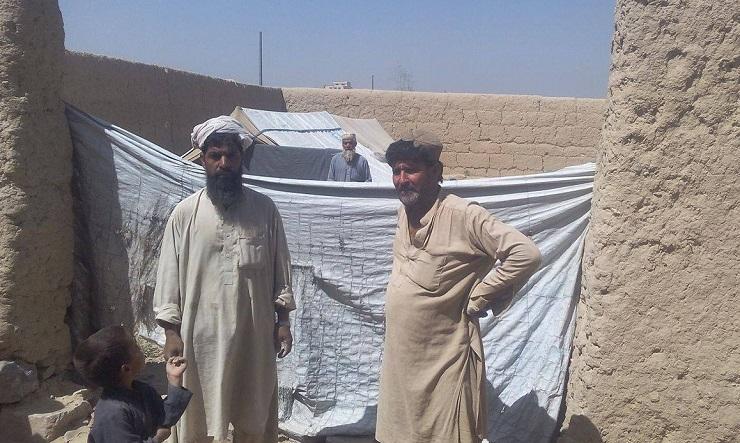ASIACALLING
Afghan refugees returning home amid uncertainty
" In Afghanistan thousands of Afghans are making their way home after decades living as refugees in neighboring Pakistan. For many of these former refugees, their own country is now a foreign place."

In Afghanistan thousands of Afghans are making their way home after decades living as refugees in neighboring Pakistan.
For many of these former refugees, their own country is now a foreign place.
From the capital Kabul, Shadi Khan Saif has this story on the long road of integration ahead.
For years, migration has left deep marks on the lives of Afghans, so much so that this national grief is often reflected in Afghan folk songs.
Years of wars in the country, initially sparked by the Soviet invasion in the 1980s, forced millions of Afghans to flee the country.
Many more followed when the country plunged into a deadly civil war in the 1990s, and then during the oppressive regime of the Taliban in the mid 1990s.
Roughly three million Afghan refugees living in Pakistan now have only four months to pack-up and return to their war-torn country for good.
From the beginning of this year, a record 30,000 refugees said goodbye to Pakistan due to mounting persecution and uncertainty surrounding the legal status of their stay.
Pakistan extended their stay at the last moment but only for six months with a warning of no more extensions.
Nader Farhad, a spokesman for the United Nations High Commissioner for Refugees (UNHCR) explained some other reasons behind the sudden surge in the number of refugees returning.
“In the last month alone we saw a large number of refugees return because of the increased stipend and growing persecution in Pakistan, each returning refugee is now paid $400 so a family of let’s say five members can get up to $2,000 dollars,” stated Farhad.
![]()
In the past, the refugees were only paid around $200 – hardly enough to even cover the transportation costs.
While thousands have now decided to return to Afghanistan, most have no idea what they will do next.
Tila Mohammad, a father of four spent 25 years as a refugee in Pakistan and has now returned –literally empty handed.
“Look at my hands, with these bare hands we are working in this open field to erect a mud house for the children to live in, both the governments [Afghanistan and Pakistan] promised us help and facilities but we haven’t got anything except the money given to us on arrival by the UNHCR,” Mohammad told me.
The story of Tila Mohammad is shared by almost everyone repatriated back to Afghanistan from Pakistan.
Deprived of many basic facilities in Pakistan, they lived a life of compromise and sacrifice.
Malik Sedique, an elderly Afghan who migrated to Pakistan during the 1980s says it doesn’t look much different now.
“We were called refugees throughout our stay in Pakistan, and now as we have returned people are saying the ‘refugees’ have returned, the government did not consult us and decided our repatriation. In all those years, many women become widows and children became orphans, they should have been warmly welcomed back home but this is not the case,” said Sedique.
Almost every returning family claims to have paid thousands of rupees to the Pakistani border forces to allow them carry their wood, animals, trunks, utensils and other goods across the border.
Many parts of modern-day Pakistan, including the whole of northwestern Khyber Pakthunwa, and many districts of southwestern Baluchistan were part of the greater Afghanistan before British rule over India.
![]()
An overwhelming majority of the Afghan refugees are ethnic Pashtuns meaning they share an ethnic lineage with their Pakistani hosts.
Analyst Tahir Zaland believes the refugees bore the brunt of cold ties between the two countries that worsened after cross-border skirmishes last month.
“Eventually it is a good thing that these refugee return to their home country but the government and aid agencies should create better environment for them to integrate and overcome the early problems,” Zaland commented.
The Afghan government has promised to provide land to each repatriated family.
In Kabul, land has already been designated for the refugees in four areas, but the allocation process is slow and complicated.
Even still, some, like Dawlat Khan, a recently repatriated Afghan, are happy to be home.
“Thank God it is our own country, one can die with honor in one’s own land. In a foreign land even a prince is not actually prince.”
- Afghan refugees
- Pakistan
- UNHCR
Komentar (0)
KBR percaya pembaca situs ini adalah orang-orang yang cerdas dan terpelajar. Karena itu mari kita gunakan kata-kata yang santun di dalam kolom komentar ini. Kalimat yang sopan, menjauhi prasangka SARA (suku, agama, ras dan antargolongan), pasti akan lebih didengar. Yuk, kita praktikkan!